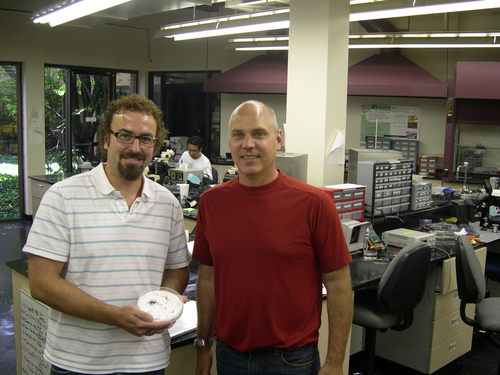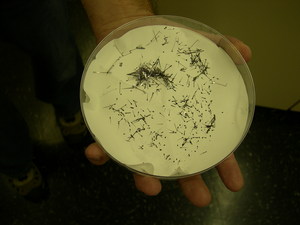U-M spinoff NeuroNexus doubles office size, plans hiring as its brain stimulation technology advances

Rio Vetter, left, and Daryl Kipke of NeuroNexus Technologies stand in the company's lab on Research Park Drive. Photo by Dan Meisler for annarbor.com.
Since its founding in 2003, the company has supplied researchers with "neural interface products," which stimulate, deliver drugs to, or record the activity of neurological systems in a research setting. But they've begun work on clinical applications that would be used in deep-brain stimulation surgeries and treatment of neurological diseases.
NeuroNexus President and CEO Daryl Kipke said the company has two clinical products in the works: a deep-brain stimulation system being developed in partnership with Philips, and a disposable surgical electrode.
"Over the last six years, we've taken our core technology and developed and expanded on that to develop a diverse line of neural interface products," Kipke said.

NeuroNexus Technologies' neural interface products stimulate and measure brain activity. Photo by Dan Meisler for annarbor.com.
A combination of the company's emerging technology, which it says can deliver more focused treatment than existing systems; competitively won grants and contracts; a 2008 award of nearly $1 million from the state's 21st Century Jobs Fund; the aging of the baby boom generation; and the lagging real estate market are allowing NeuroNexus to position itself for continued growth.
"This would basically be the next generation of that system," Vetter said. "It would be more precise and selective in activation of tissue ... The goal is to reduce side effects."
The disposable electrodes under development would be used in the surgeries to put in deep-brain stimulation systems.
The aging of the baby boom generation promises to provide a steady, if not increasing, demand for such surgeries and treatments. Parkinson's typically affects people older than 50.
But Kipke said scientific advancements, along with demographics, also will work in the company's favor. For example, current research is exploring deep-brain stimulation therapy for obsessive-compulsive disorder and untreatable depression. That promises to increase the demand for deep-brain surgeries and therapies also.
"That would be one thing breaking in our favor," Kipke said.
Vetter added that the company is seeing increased sales in Europe and Asia -- specifically Japan and China, and that it plans to ramp up its sales pitch to potential new customers.
"We're at the beginning of launching a large marketing campaign," he said. "In the past we haven't put much effort in that."
Kipke said that if everything goes as planned, the company will hire between five and eight new employees to add to its staff of 22.
With potential growth factors firmly in place, Kipke said that NeuroNexus, a closely held private company that has never asked for outside private investment, was ready to find a larger physical space than its current 5,000-square-foot home on Research Park Drive off South State Street. The sagging commercial real estate market offered a relatively inexpensive chance to do so, and the company will move into 10,000 square feet at 655 Fairfield Court in Avis Farms.
"The opportunity is that this is a good market for tenants," Kipke said.
Both real estate brokers involved in the lease transaction agreed, but also said more companies like NeuroNexus -- that is, existing firms looking to expand -- are starting to thaw local commercial real estate from its deep freeze of the past few years.
Bart Wise of Swisher Commercial, who represented NeuroNexus, said, "compared to a year ago, the office and high-tech markets have improved significantly."
He said one of the challenges in finding new space for the company was to locate a suite with office and lab space that didn't need significant renovations. He said he seriously looked at about half-a-dozen locations. Another key stipulation was that the new landlord -- Tom Helberg as part of BMT Ann Arbor LLC -- will allow the company to grow into the 10,000 square feet, meaning it can eventually have access to the entire space but only pay rent on what it uses.
Jay Chavey of Signature Associates represented Helberg, and agreed the office and high-tech market is tightening up. But both Wise and Chavey said it is nowhere near what it was a few years ago, which is good news for tenants and bad for landlords.
"Landlords are realizing, this is what it is," Chavey said.
Dan Meisler is a freelance reporter.

